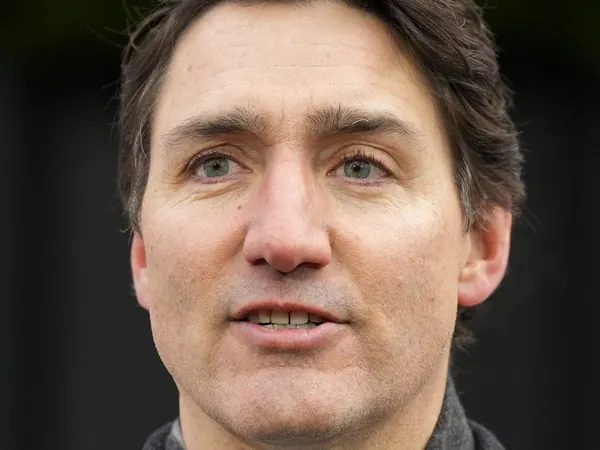
Who Will Rise to the Challenge? Exploring Potential Successors to Justin Trudeau as Liberal Leader
2025-01-06
Author: Olivia
As the political landscape shifts following Prime Minister Justin Trudeau's surprising resignation, the question on everyone's mind is: who will take the reins of the Liberal Party of Canada? With Trudeau stepping down and the party's popularity at a concerning low—polls showing support at just 13 percent—can the Liberals recover before the next federal election?
Recent data from the Angus Reid Institute indicates that while the Liberal Party seems to be facing a bleak future, 32 percent of Canadians might still consider supporting a new leader, hinting at a potential opportunity for rebuilding. This sentiment is crucial as many Canadians associate Trudeau's leadership with the party's struggles; 59 percent of moderates who say they might vote Liberal express dissatisfaction with him. Interestingly, 66 percent of current Liberal supporters approve of Trudeau, yet a significant 60 percent agree it was time for a leadership change, suggesting a complex relationship with the outgoing Prime Minister.
The Contenders: Who Are the Top Picks to Lead the Liberals?
1. Chrystia Freeland: Former Deputy Prime Minister and Finance Minister Freeland has been a close ally of Trudeau. Recently resigning from her cabinet role, she is seen as one of the front-runners for the leadership. Born in Peace River and raised in Edmonton, Freeland's education from Harvard and experience as a journalist lend her a unique background. Current polls suggest that 21 percent of Canadians would vote for a Freeland-led Liberal Party. However, her ties to Trudeau's policies could hinder her, as almost 29 percent of respondents indicated they would be less inclined to vote for her.
2. Mark Carney: Previously the Governor of the Bank of Canada, Mark Carney is another potential successor. Despite speculation about his leadership capabilities, his association with the Liberals hasn't generated enthusiasm among voters. With only 14 percent of those polled indicating they would support a Carney-led party, he faces an uphill battle, particularly with the Conservatives eager to label him 'Carbon Tax Carney.'
3. Mélanie Joly: Quebec’s Foreign Affairs Minister has been an important figure during international crises. Given that Quebec is crucial for the Liberals, Joly could provide a valuable advantage with 17 percent of voters in Quebec potentially supporting her leadership. Yet, only 10 percent overall believe her leadership would boost the Liberal vote.
4. Anita Anand: The current Transportation Minister and former Defence Minister is actively seeking the leadership role. Despite her credentials and academic background—having taught at Yale—Anand faces challenges with just 12 percent of Canadians indicating they might vote for her.
5. Dominic LeBlanc: A veteran politician and long-time confidant of Trudeau, LeBlanc has extensive experience in cabinet but struggles to impress nationally with only 12 percent indicating they would vote for him. However, he remains popular in Atlantic Canada, with a potential support rate of 31 percent.
6. François-Philippe Champagne: As the Industry Minister and a Quebec representative, Champagne's track record in attracting investment could be beneficial. Nevertheless, under his leadership, polls indicate that the party would trail the Conservatives by five points in Quebec.
In summary, as the Liberal Party looks toward its future without Trudeau, a select few are stepping into the spotlight as potential leaders. The party's ability to reclaim support will depend significantly on who emerges victorious from the leadership contest and whether they can devise a strategy to reconnect with disenchanted voters ahead of the looming federal election. The stakes are high—will the next leader be able to turn the tide, or are the Liberals fated for further decline? The political scene is set for a thrilling political drama in the coming months!



 Brasil (PT)
Brasil (PT)
 Canada (EN)
Canada (EN)
 Chile (ES)
Chile (ES)
 Česko (CS)
Česko (CS)
 대한민국 (KO)
대한민국 (KO)
 España (ES)
España (ES)
 France (FR)
France (FR)
 Hong Kong (EN)
Hong Kong (EN)
 Italia (IT)
Italia (IT)
 日本 (JA)
日本 (JA)
 Magyarország (HU)
Magyarország (HU)
 Norge (NO)
Norge (NO)
 Polska (PL)
Polska (PL)
 Schweiz (DE)
Schweiz (DE)
 Singapore (EN)
Singapore (EN)
 Sverige (SV)
Sverige (SV)
 Suomi (FI)
Suomi (FI)
 Türkiye (TR)
Türkiye (TR)
 الإمارات العربية المتحدة (AR)
الإمارات العربية المتحدة (AR)